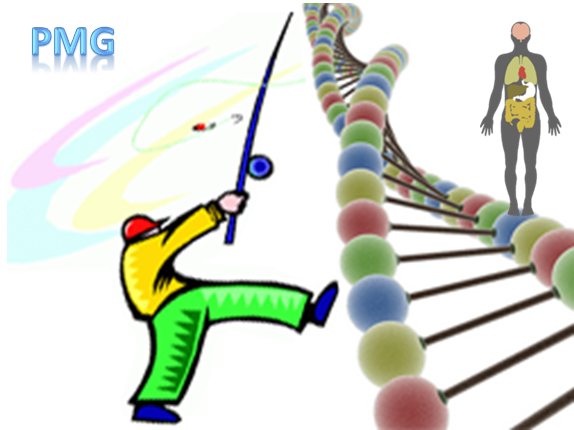Our Research Theme
Genome is the source code repository of almost all living things, determining the onset and development of many diseases. However, there are complex relationships between DNA variants and human diseases due to high dimension, space-time specificity and so on. Accurately knowing the relationships is indispensable for modern precision medicine, which determines the depth and breadth of precision medicine development in the future. In the "precision medicine genomics" laboratory, we have long devoted ourselves to developing computational methods for precision medicine. Specifically, we invented accurate statistical learning models and powerful and faster software tools to dissect the genotype-phenotype relationship deeply and insightfully. The new methods aim to facilitate "decoding the secret of genetic disorders", which is challenging work in most scenarios. In terms of scientific discipline, precision medical genomics is also a key and popular interdisciplinary discipline. This field has attracted outstanding talents in biology, medicine, mathematics, computer science and other majors to work together to make something great!

Our Research Team
With a mission of "decoding the secret of genetic disorders", the precision medicine genomics laboratory was established in 2013 by Prof. Miaoxin Li at the Faculty of Medicine, the University of Hong Kong. It was moved to Zhongshan School of Medicine, Sun Yat-sen University in 2016. Multiple doctoral and postdoctoral members trained in this lab have received senior job titles including professors. The current laboratory has five postdoctoral fellows and more than 10 Ph.D. and M.Phil. students, constituting a multidisciplinary research team with both novices and experts. After more than a decade of efforts, the laboratory has already created many source codes for disease genome analysis, multi-omics sequencing data, analysis pipelines, teaching materials, compuational platforms, and so on. People-oriented, individualized teaching according to a person's aptitude, personality and interest, and freedom of scientific research are the basic management and training strategies in the laboratory. Therefore, the laboratory has had an "innovative, rigorous, democratic, and responsible" culture and all its members enjoy their research projects.
Our Research Studies
The laboratory has long been committed to methodological studies on analyzing the genetic code of disease phenotypes based on big genomic data, focusing on rare disease genomics, complex disease genomics, tumor genomics, and pharmaceutical genomics. In the field of large-scale genome sequencing data mining, we have developed a series of analysis methods and software tools that are well known by international peers, such as KGG, KGGSeq, KGGSEE, etc. At present, the laboratory mainly has the following three research directions:
1. Innovation of accurate analysis model:
Build statistical or intelligent learning models which can integrate genome, transcriptome and other multi-omics data to locate pathogenic mutations and genes, infer the pathological mechanism related to mutations, evaluate the risk of individual genetic diseases, and screen effective therapeutic drugs.
Achievements: J Hum Genet. 2022; Acids Res. 2022; Genome Biol. 2019; Acids Res. 2019; Acids Res. 2022;
2. Development of high-performance algorithms:
Develop generic and efficient algorithms and software for rapid processing and annotation of large-scale genome-wide DNA/RNA sequencing data.
Achievements: Acids Res. 2017; Acids Res. 2012; Patent application number:202011371618.0
3. Analysis of genomic data of disease:
Systematic genetic mining and analysis of specific diseases (including tumours, brain diseases, etc.) by using integrative methods of multi-omics data.
Achievements: Elife. 2022; Cell Infect Microbiol. 2022; BMC Neurol. 2021; Neurobiol Aging. 2017; Am Heart Assoc. 2017;
Representative Research Grants as the Principal Investigator
- Development of a Mendelian randomization method for inferring genes directly associated with complex diseases and its application from Jan. 2022 to Dec 2025.(Natural Science Foundation of China (NSFC), Project Code: 31970650)
- Development of statistical tests for cancer-driver genes based on truncated negative binormal distribution and their application study from Jan. 2020 to Dec 2023.(Natural Science Foundation of China (NSFC), Project Code: 31970650)
- Development of methods for interpreting genome-wide association signals based on genes’ conditional association and tissue-specific expression from Jan. 2018 to Dec 2021.(Natural Science Foundation of China (NSFC), Project Code: 31771401)
- Development of multivariate gene-based association analysis approaches for endophenotypes of
complex diseases and their application to genetic mapping in a Chinese schizophrenia sample from
Aug. 2015 to July 2017.(Natural Science Foundation of China (NSFC), Project Code:
02132236)
[The excellent achievement award for the 10th anniversary of the foundation in 2021] - Statistical method to identify risk genes of complex diseases based on functional gene sets and networks, with a genetic data mining application to hepatocellular carcinoma from May 2014 to April 2016.(Natural Science Foundation of China (NSFC), Project Code: 01121436)
Representative Research Achievements
- Jiang L#, Xue C# Dai S, Chen S, Chen P, Sham PC, Wang H*†, Li M*†. DESE: estimating driver tissues by selective expression of genes associated with complex diseases or traits, Genome Biology, 2019, 20(1): 233
- Jiang L, Miao L, Yi G, Li X, Xue C, Li MJ, Huang H, Li M*†. Powerful and robust inference of complex phenotypes’ causal genes with dependent expression quantitative loci by a median-based Mendelian randomization. Am J Hum Genet. 2022 May 5;109(5):838-856.
- Liubin Zhang, Yangyang Yuan, Wenjie Peng, Bin Tang, Mulin Jun Li, Hongsheng Gui, Qiang Wang, Li M*†. GBC: a parallel toolkit based on highly addressable byte-encoding blocks for extremely large-scale genotypes of species. Genome Biol 24, 76 (2023).
- Patent application for a large-scale genotype data block compression algorithm and computer equipment, application No.202011371618.0
- Chapter of “principles and methods of disease genome analysis” in the textbook of bioinformatics for 8-year program medical students (People’s Medical Publishing House)
